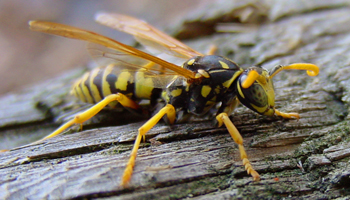Yellow jacket wasps become a nuisance in our area from late summer until the first freeze.
They scavenge for food this time of year and unfortunately, they are attracted to human food.
 |
This is the season for yellow jacket wasps, which typically are in food-scavenging mode at this time of year. |
To avoid stings:
- Never swing, strike or run away rapidly from a yellow jacket. Quick movements can provoke the wasp.
- If you’re eating outdoors, keep your food covered especially fruit and soft drinks.
- Refuse containers should have tight-fitting lids. Pet bowls should be cleaned after using.
- Pick fruits as soon as they ripen and pick up any fallen fruit rotting on the ground.
- Avoid wearing perfume, aftershave lotions, scented soaps and shampoos when you will be in areas where bees and wasps congregate.
- Avoid wearing bright flowery prints. Jewelry that is shiny may also attract bees and wasps.
To treat stings:
- Remove the stinger with a gentle scraping motion using a credit card or fingernail. Don’t squeeze or pull the stinger or you’ll release more venom.
- Clean with soap and water.
- Apply ice compresses for 15-20 minutes at a time.
- Watch for indications of a sudden allergic reaction such as itching, wheezing, faintness, sweating, confusion, hives or rash. Contact a physician or visit the nearest emergency department at the first sign of these symptoms, which could become life-threatening.
- Delayed reactions may occur 10 to 14 days after a sting. Contact a physician if the person stung experiences fever, discomfort, hives, headache or itching.
For more information, call the Nebraska Regional Poison Center at 1-800-222-1222.